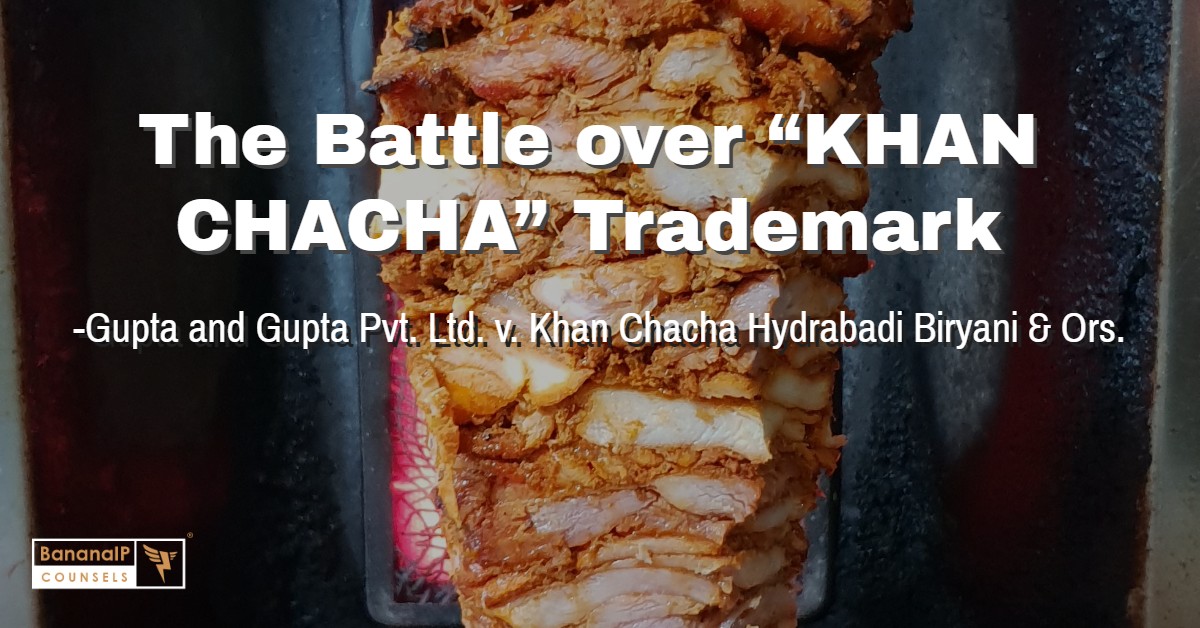In a recent case between 6 the Delhi High Court in an exparte order restrained the infringing food entities from using the trademark “Khan Chacha”. The plaintiff, Gupta, and Gupta Pvt Ltd alleged that the defendants were infringing on their trademark and causing confusion in the market by using a similar name.
Facts
The plaintiff Gupta And Gupta Pvt Ltd submits being a proprietor of the registered mark “Khan Chacha”. The plaintiff furthermore claimed a user date for the aforementioned trademark which is April 1st, 1972. The plaintiff emphasized that the said mark was protected for food items and services related to the restaurant. According to the plaintiff, the mark is inventive and arbitrary in nature about the services offered by the plaintiff in the trademark classifications 29 and 43 under which the earlier mentioned mark is protected. The plaintiff also claimed that the defendants were using a mark that was registered and owned by the plaintiff, which constituted trademark infringement as it had been done without authorization.
Observation of the Court
The plaintiff sought a decree of injunction against the food entities from using, advertising, or promoting, directly or indirectly their trademark. The plaintiff also alleged that the services offered by Defendants 1 to 24 are similar and identical to the plaintiff’s services. Additionally, the similar and identical services provided by the defendants are under the mark name that is registered and owned by the plaintiff. This amounts to trademark infringement as the use of the mark by the defendant has been done without any authorization, as I own the trademark registration to the inventive and arbitrary mark “Khan Chacha”, stated the plaintiff. For the defendants 25 and 26, namely Zomato.Ltd and Bundl Technologies Private Limited, which functions under the name Swiggy, the plaintiff prayed and asserted the fact that the infringing parties should be delisted from their respective apps and websites. The plaintiff furthermore claimed that the unnamed defendant also indulged in similar infringing activities. As a result, the plaintiff sought an injunction against all the defendants and prayed for relief in the form of an order to restrain the defendants from using the plaintiff’s trademark and from offering similar services under a deceptively similar mark.
Judgment
The bench while granting an interim injunction against the infringers referred to the cases of Midas Hygiene Industries (P) Ltd v Sudhir Bhatia and Laxmikant V. Patel v. Chetanbhai Shah and observed that in infringement cases involving trademarks or copyrights, an injunction is usually granted regardless of any delay in taking legal action, especially where the infringing mark was adopted dishonestly and further stated that business names are typically trademarks to avoid confusion in the minds of the public. Justice C.Hari Shankar believed that the plaintiff has established a prima facie case for trademark infringement and believed that “Khan Chacha” was distinctive and had acquired secondary meaning in the minds of the public through extensive use by the plaintiff. The Delhi High Court held that the trademark of the plaintiff is unique and any entity using the name “Khan Chacha” would be infringing the plaintiff’s right under section 29(1) of the Trade Marks Act,1999. The court also further instructed the food delivery giant Zomato and Swiggy to block the infringing parties which traded with “Khan Chacha” in their name from their applications and websites. The Delhi High Court passed an interim injunction dated 06/02/2023 order restraining 24 food eatery entities from using the trademark “Khan Chacha”.
Conclusion
This case highlights the importance of trademark protection in the food industry and the need for businesses to take adequate measures to safeguard their trademarks from infringement. It also underscores the need for businesses to be vigilant in monitoring the market for potential trademark infringements and taking appropriate legal action to protect their brand.
Source: https://www.livelaw.in/pdf_upload/06022023-457825.pdf
Authored by Ipshita Bhattacharyya (Associate, Banana IP Counsels), and Pranav Wadhawankar (Intern, BananaIP Associates)

